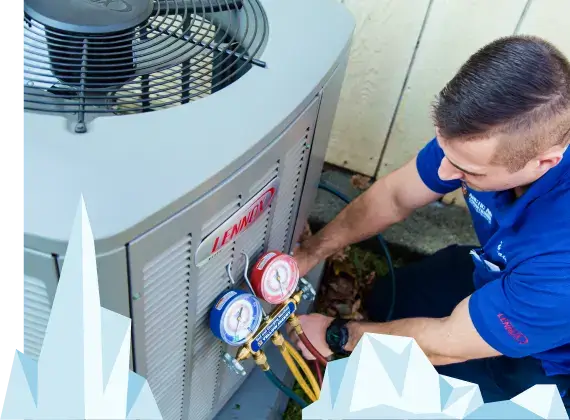Just How to Pick the Right Heating And Cooling System for Your Requirements
Choosing the suitable heating and cooling system is an important choice that needs cautious consideration of various factors. Begin by assessing your home's dimension, format, and unique demands, as these components determine the required capacity and setup of the system. Additionally, establishing a budget plan that encompasses installment and long-lasting operational costs is vital. As you evaluate your options, recognizing energy effectiveness ratings and the ramifications of your neighborhood environment will play a substantial role in your selection. The myriad of system kinds offered can complicate this process, leading one to question which course inevitably leads to ideal comfort and efficiency.
Evaluate Your Home Dimension
Evaluating your home size is a crucial initial step in selecting the proper a/c system. The dimension of your home directly influences the cooling and heating capacity required for reliable climate control. An a/c system that is also small will certainly battle to maintain comfortable temperatures, leading to raised power consumption and wear on the system. Conversely, an extra-large system can lead to brief cycling, inadequate moisture control, and ineffective procedure.
To accurately evaluate your home dimension, measure the square footage of each room, taking into consideration variables such as ceiling height and the layout. In addition, think about the insulation quality and the number of windows, as these aspects impact thermal efficiency. Homes with open floor plans may need various system setups compared to those with numerous separated rooms.
Utilizing the Handbook J tons computation method can give an extra exact estimate of your HVAC requires. This technique make up different variables, consisting of local climate, solar gain, and occupancy patterns. By meticulously examining these facets, you can ensure that your picked heating and cooling system is appropriately sized, resulting in boosted convenience, energy effectiveness, and durability of the tools.
Determine Your Spending Plan
Identifying your budget is a pivotal step in the HVAC system option process, as it establishes the parameters for your choices - DMAKS HVAC. A HVAC system is a significant financial investment, and understanding your financial limitations will help narrow down options that fit within your ways
Begin by examining not only the first acquisition price but additionally installation prices, which can differ dramatically relying on the intricacy of the job. Consider continuous expenditures such as maintenance, repair work, and power usage. A system may show up cost effective at first however can lead to greater expenses with time if it is much less effective.
It is advisable to designate a backup fund for unanticipated costs that might emerge during installment or first system adjustments (DMAKS HVAC). Additionally, explore funding alternatives or discounts that may be available, as these can ease the problem of in advance prices
Ultimately, having a clear spending plan enables you to involve with cooling and heating experts better, guaranteeing you obtain customized advice that straightens with your monetary goals and home needs. By being thorough regarding your budget plan, you can make informed decisions that improve convenience without compromising economic stability.
Evaluate Energy Effectiveness
Energy efficiency plays a crucial duty this post in the general efficiency and cost-effectiveness of your heating and cooling system. When picking a system, it is click for more essential to consider its energy effectiveness scores, as these figures straight influence your utility bills and environmental impact. Search for systems with a high Seasonal Energy Performance Ratio (SEER) for cooling down and a high Annual Fuel Utilization Performance (AFUE) score for home heating. Higher scores show better performance, indicating more convenience for less power usage.
In addition, consider the Energy Celebrity qualification, which signifies that the system satisfies stringent efficiency standards established by the Environmental Defense Firm. Buying a Power Star-rated a/c system can result in substantial cost savings over time, specifically in locations with extreme temperature level fluctuations.
An additional aspect to assess is the system's size and capacity. An extra-large or small device can lead to ineffectiveness and enhanced energy costs. DMAKS HVAC. Proper sizing, usually determined through a Manual J load estimation, guarantees that the system runs at optimal effectiveness


Take Into Consideration Climate and Environment
When choosing a HVAC system, it is important to think about the neighborhood environment and environmental problems, as these aspects considerably affect the system's performance and performance. Various areas experience differing temperature extremes, moisture levels, and seasonal adjustments, all of which influence heating and cooling down needs.

Additionally, neighborhood ecological variables, such as air top quality and prospective allergens, ought to educate your choice. Solutions furnished with advanced filtration technologies can assist minimize toxins and provide cleaner air. Additionally, think about the power resources offered in your area-- some cooling and heating systems are more effective when powered by gas or sustainable power resources.
Eventually, straightening your cooling and heating system selection with your regional environment and environmental considerations will cause enhanced convenience, improved effectiveness, and reduced energy costs.
Explore System Types and Attributes
As property owners look for to enhance comfort and effectiveness, checking out the different sorts of HVAC systems and their distinct features becomes essential. The primary kinds of HVAC systems include air conditioning, warmth pumps, ductless mini-split systems, and heating systems. Each system uses distinct advantages tailored to various needs and choices.
Central air conditioning systems provide uniform air conditioning throughout a home, making them ideal for bigger areas. Heatpump offer as both heating and cooling services, utilizing electricity to move heat, which can cause lower power expenses. Ductless mini-split systems are becoming significantly prominent due to their adaptability and simplicity of installation, enabling home owners to control the temperature level in individual spaces without considerable ductwork.

Final Thought
Finally, selecting the ideal heating and cooling system requires careful consideration of various variables, including home size, spending plan restrictions, power performance, neighborhood climate, and readily available system kinds. A detailed analysis of these elements makes sure optimal convenience and cost-effectiveness. By adhering to a structured approach, house owners can make educated decisions that straighten with their particular requirements and preferences, eventually bring about improved indoor air quality and energy financial savings.